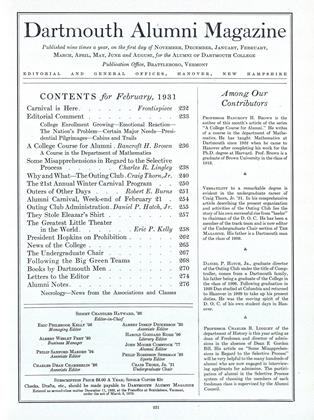By Robert E. Riegel. New York, 1930. Henry Holt and Company, pp. x, 595.
It is now almost forty years since the appearance of Professor Frederick Jackson Turner's brilliant essay on "The Significance of the Frontier in American History." Published just as our last frontier was disappearing, Professor Turner's study called the attention of the student of American history to the startling fact that one of the most potent forces in the evolution of an American nation, as distinct from just another European nation in the new world, had lost its vitality. America had ceased to move west, and the whole frontier process had become a matter of history. It was Turner's suggestion that the time finally had arrived for a thoroughgoing historical survey of thel westward movement of the American people, and inspired by his leadership, and often by his guidance, a goodly number of able young historians took up the task. Since that time a generation has passed, and much of the essential spadework of research has been done. Now we are beginning to reap the reward in our first extended syntheses of western history. The first of these works, The History of the AmericanFrontier by Professor Frederick L. Paxson of Wisconsin won the Pulitzer Prize in American history for 1924, while the past year produced at least two more significant books in the same field. One of these was AmericaMoves West by Professor Robert E. Riegel.
In part America Moves West was the outgrowth of Professor Riegel's early work in western history under Professor Paxson at Wisconsin, more immediately it is the product of a course on the History of the West which he has been giving for several years. It is based, therefore, upon extensive studies and much practical teaching experience in the field of western history. Indeed, AmericaMoves West was written primarily with the classroom in mind, and in the reviewer's judgment it appears to be the most satisfactory and teachable text that has yet appeared in its field. In length the book is just about right for the usual semester course devoted to western history. The chapters, in number and individual length, appear to be well adapted to class use, although in one or two instances it seemed as if the order in which they were presented might have been improved. The subject matter of the book is well-balanced and is adequately treated, although possibly a bit more attention might have been given to the economic grievances of the west during the generation following the Civil War. There are also a few factual errors of the kind that will creep unaccountably into a first printing. Professor Riegel's style, though not brilliant, is readable and carries one along quite in harmony with westward moving America. In other words, he has succeeded rather well in conveying to the reader a sense of the move. ment in the great sweep of the American people across the continent. As a textbook, America Moves West should be a success.
But if Professor Kegel's book was intended principally as a textbook in western history, it is not without its attractions for the general reader, for the story that it tells, is always interesting and often dramatic. The adventures of the early explorers to the west of the mountains, the frontier warfare with the Indians, the romance and business of the fur trade, the conquests of George Rogers Clark, the western intrigues of Aaron Burr, as well as the story of the fortyniners and the wanderings of the Mormons, all make fascinating reading. Equally interesting, if less exciting, are the chapters dealing with the governmental problems of the early settlers in the west, their transportation difficulties, the evolution of the land system, and the progress of western culture. Nor has Professor Riegel neglected "The West of Song and Story." In a word, the general reader should find in the book much that is entertaining and instructive, and it is devoutly hoped that what has been said of its virtues as a textbook will not scare him away.
All in all America Moves West is a satisfactory and valuable contribution to our growing literature of the westward movement.
 View Full Issue
View Full Issue
More From This Issue
-
 Article
ArticleWhy and What—the Outing Club
February 1931 By Craig Thorn, Jr. '31 -
 Class Notes
Class NotesCLASS OF 1930
February 1931 By Albert I. Dickerson -
 Lettter from the Editor
Lettter from the EditorPresident Hopkins on Prohibition
February 1931 -
 Class Notes
Class NotesCLASS OF 1923
February 1931 By Truman T. Metzel -
 Lettter from the Editor
Lettter from the EditorEditorial Comment
February 1931 -
 Class Notes
Class NotesCLASS OF 1910
February 1931 By "Hap" Hinman
W. R. Waterman
-
 Books
BooksTHOMAS JEFFERSON. THE APOSTLE OF AMERICANISM.
FEBRUARY 1930 By W. R. Waterman -
 Books
BooksTHE GOLDEN STAR OF HALICH; A TALE OF THE RED LAND IN
NOVEMBER 1931 By W. R. Waterman -
 Books
BooksTHE MISSISQUOI LOYALISTS
October 1938 By W. R. Waterman -
 Books
BooksA HISTORY OF AMERICAN ECONOMIC LIFE
October 1951 By W. R. Waterman -
 Books
BooksINDUSTRY COMES OF AGE.
January 1962 By W. R. WATERMAN -
 Books
BooksTHE ROAD TO RENO.
June 1962 By W. R. WATERMAN
Books
-
 Books
BooksShelflife
Mar/Apr 2013 -
 Books
BooksTHE PASSING OF THE SAINT
April 1941 By Andrew G. Truxal -
 Books
BooksFunny Latins Chileans Are Not
May 1975 By BERNARD E. SEGAL -
 Books
BooksOPTICS: AN INTRODUCTION FOR OPHTHALMOLOGISTS.
May 1961 By GORDON H. GLIDDON -
 Books
BooksTHE SECOND AMERICAN REVOLUTION: THE NEAR COLLAPSE OF TRADITIONAL DEMOCRACY.
JULY 1964 By KALMAN H. SILVERT -
 Books
BooksTHE PROBLEM OF HISTORICAL KNOWLEDGE.
January 1939 By William Kelley Wright


